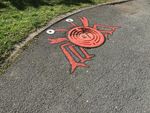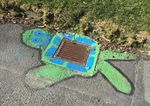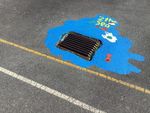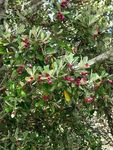PREDATOR FREE WELLINGTON SCHOOLS
←
→
Page content transcription
If your browser does not render page correctly, please read the page content below
PREDATOR FREE
WELLINGTON SCHOOLS
Your monthly newsletter
ĀKUHATA / AUGUST 2020
WELCOME TO AUGUST'S NEWSLETTER
Seatoun School has been an active member of Predator Free Schools since the organisation
started, and while we have not been catching so many rats this year due to the great success of
the Predator Free Miramar programme, we have still been actively promoting many messages of
Manaakitanga for the environment across our school.
In this month's newsletter, we wanted to share some of these ideas along with some interesting
facts about the native world we care so much about.
Supported by:
This is a newsletter made by primary students in the Predator Free
Wellington Schools Programme. It is aimed at all students at schools
taking part in the programme on and around the Miramar peninsula.
Any questions or queries, please have a look on the www.pfw.org.nz
website, or send an email to education@visitzealandia.comSTORY OF THE MONTH
Matariki Night by Taleisha and Coco
Last Monday, Seatoun School hosted a magical Matariki Night celebration, jam
packed with singing, speeches, manaakitanga rocks and scrumptious hot
chocolate.
Seatoun School has hosted this event for the last three years. Families gather
together in seven different meeting points around the beautiful Seatoun village
and walk, wrapped in layer upon layer, under a glowing star towards the
school.
Manaakitanga means displaying caring attitudes towards each other and a
willingness to support each member of our community. Children wrote a
commitment to show Manaakitanga in our community over the coming year on
the rocks which are now displayed in the playground. This includes being kind
to our environment and looking after the native creatures which live in this
area.BIRD OF THE MONTH
The Albatross by Emma
Diomedeidae
Facts
The albatross is the world's largest
sea-bird
They can live at least into their 60’s.
They have the largest wingspan of
any living bird.
The albatrosses wingspan is 2.9 to
3.3 meters
Global warming may cause a
(temporary) population spike. Image by Tony Whitehead www.wildlight.co.nz
Tiger sharks are the top predators Light mantled sooty albatross Phoebetria palpebrata
to albatrosses. The albatross found on a Wellington street which later died
To find more information look at these despite help at Wellington Zoo was a light mantled sooty, like
links- the one in this photograph. Two small pieces of plastic were
https://www.doc.govt.nz/nature/native- found in its stomach, however, Australian researchers have
animals/birds/birds-a-z/albatrosses/ found that sea birds are 30 times more likely to be killed by a
https://www.doc.govt.nz/nature/native- balloon than hard plastic. Everyone can help by picking up
animals/birds/birds-a- the tiny bits of plastic they see on the beach and stop buying
z/albatrosses/royal-albatross-toroa/ balloons!
http://nzbirdsonline.org.nz/species/sout
hern-royal-albatross
PLANT OF THE MONTH
Karo
Pittosporum crassifolium
The plant in our group photo below is the Karo, a much maligned
native of the north island which is not celebrated as having any
particularly redeeming features! It is not strong enough to use as
decent building timber and does not even make very good
firewood. Why include it as plant of the month you might ask?
This tree has been grown from seed and will eventually look like
this image from Te Ara on the left. We will plant it in our new
lizard habitat because it is hardy and will survive even the
stronger salt winds which we regularly experience here at
Image and information courtesy of
Seatoun. We were looking for trees and shrubs which would
Teara.govt.nz
provide shelter for any lizards that want to make their home with
us and so this is a perfect example! So not so useless after all!Raising awareness of litter at school by Soli
Would you rather live in a world full of litter and plastic, or a world
without? At Seatoun School, we prioritise our environment and our
native wildlife, but due to litter and plastics, we lose plenty of natural
wildlife every single year. And yet, more and more plastic is brought in
every day! As our school is so incredibly close to the Wellington
harbour, litter gets blown into the harbour every day.
The fact of the matter is, a lot of the litter is brought in by all the
students in our lunchboxes. So to save our natural wildlife for future
generations, Seatoun School implemented a program called Litterless
Lunches, a program in which one day a week, all the children in a class
get their lunchboxes out and a monitor from each class checks their
peers' lunchboxes. If they have any single use plastic or non-reusable
wrapping, they get no reward. But if they only have reusable or
compostable alternatives, they get a house point for their school
house. At an assembly later in the week, once the litterless
percentages for each classroom have been calculated, the classroom
with the highest percentage of successful lunchboxes gets to hold the
Litterless Lunch trophy. This is our third year of this initiative and we
still have work to do!
These are some of the storm drains on our
property which we painted to remind
everyone that most of our discarded rubbish
ends up in the sea.Pets as Predators
The problem
Cats don't just kill by Millie
rodents. Here in New
The solution
Zealand they kill native
Put a bell on your cat. It reduces their killing
birds, introduced birds,
impact by 50%! Also keep your cats busy so
rodents, skinks and
they don't have the urge to hunt.
invertebrates (like
Read this study from the University of Otago
insects). Just because
to learn more
your cat doesn't bring
https://phys.org/news/2010-10-bell-collars-
home natives it does not
cats-native-birds.html
mean they are not killing
them! 55% of cats are
frequent hunters.
It is not your fault if your cat
kills one bird then you do
something about it. It is your
fault if your cat is killing and
you do nothing about it!
Photo University of Otago
THIS MONTH'S EDITORS
Seatoun School
This is our regular group of Enviro Kids who have
put together the newsletter this month.
Front row - Soli, Will, Delia and Grier
Second row - Stan, Max, Coco, Emma and Emily
Back row - Kalani, Millie, Taleisha and Ilona
Nice job guys!!!!
Until next time - Manaaki whenua, manaaki tangata, haere whakamua.
(Care for the land, care for the people, go forward!)You can also read


























































